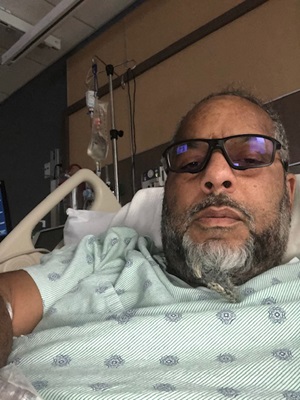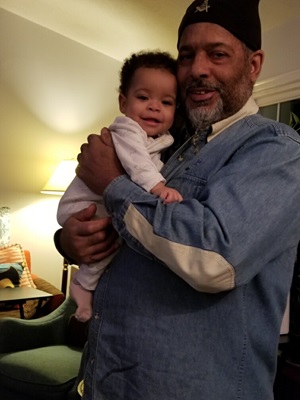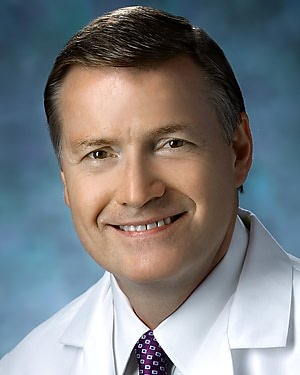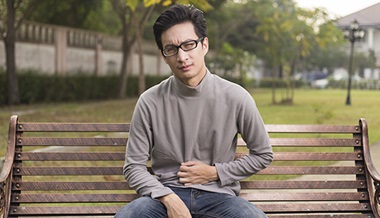Patient Story
Colon Cancer: Jerrold’s Story

Patient Story Highlights
- Jerrold Chandler was diagnosed with stage 3 colon cancer after a routine colonoscopy.
- Jerrold was on a medication for a separate condition which lowered his natural immunity. Because he was receiving care in 2020 during the height of the COVID-19 pandemic, receiving treatment at the hospital after surgery increased his risk of contracting the virus.
- His doctor worked with him to create a treatment plan that minimized the time he had to spend physically in the hospital, including scheduled telemedicine check ups.
Beating Colon Cancer During a Pandemic
Jerrold Chandler says he was feeling fine. Then during a routine screening colonoscopy in early January 2020, his doctor found an abnormal polyp that turned out to be stage 3 colon cancer. Specialists at Johns Hopkins Kimmel Cancer Center at Sibley Memorial Hospital in Washington, D.C., fast-tracked his case and managed his care mostly virtually during the COVID-19 pandemic. Now, he’s looking forward to ringing a bell at the hospital for patients who completed cancer treatment and returning to his favorite hobbies.
After the colonoscopy, Chandler’s doctor told him not to worry and referred him to Sibley, where he met with surgeon Martin Paul.
“I was pretty scared, but he explained to me what the process was,” says Chandler, age 62, of Silver Spring, Md. “I had been totally in the dark. I’m the type of guy who basically stayed away from doctors and hospitals. I hate taking medicine, even aspirin.”
Paul ordered some preoperative tests and scheduled surgery for January 23.
“They treated me really well, I mean everyone from the general reception staff to the nurses to the anesthesiologist,” Chandler says. “I guess they all could tell I was anxious. They walked me through everything gradually.”
After surgery, Chandler saw medical oncologist Valerie Lee, who discussed his options for chemotherapy. Because he was young and relatively healthy, the two agreed to an aggressive chemotherapy regimen that combined infusions of an anti-cancer medication as well as pills. Chandler had a port installed and received his first infusion in late February 2020. Soon after, the COVID-19 pandemic caused a shutdown in the Washington, D.C. metro area, as well as most of the nation. “This is when it got really interesting,” he says.
Because Chandler also took medication for interstitial lung disease, which lowered his natural immunity, and because public health experts weren’t yet sure about how the coronavirus was spreading, Lee worried about him coming to the hospital infusion center for treatment. She talked to him about switching his chemotherapy to a regimen of all pills, and he started seeing her for follow-up appointments by telemedicine instead of in person. She also advised him to stay home except for occasional appointments at a lab for bloodwork.
Chandler, who had retired from his job in cybersecurity with the federal government, relied on the support of his wife and family during this time. He says he tried to keep active at home, either reading, watching TV, cooking, or walking his dog. He also used his elliptical machine and took breaks outside on his porch for fresh air. Meanwhile, either Lee or Kaitlin Lockhart, a medical oncology nurse practitioner, called him periodically to check in. Chandler completed his cancer treatment in late August.

For now, Chandler’s bloodwork looks good, and he’ll return to Sibley in March for a CT scan. At that time, he hopes to be able to ring a bell for patients who complete cancer treatment.
Chandler says he is looking forward to receiving his COVID-19 vaccinations, and for the pandemic to recede, so he can return to his favorite activities: fishing, hunting, riding his motorcycle, traveling with his wife, and spending more time with his grandchildren.
“Everyone I dealt with at Sibley was really nice,” he says. “For what I went through, I think they did a great job, and I appreciate them for it.”
Even with the pandemic ongoing, it’s important for Americans as young as 45 to schedule their screening colonoscopies, Lee says.
“The procedure can be done very safely,” she says. “Check with your doctor about the precautions they have in place. We would much rather see people diagnosed with earlier cancers that can be cured.”
People experiencing gastrointestinal issues such as changes in their bowel movements or blood in their stool should contact their primary care providers, Lee says: “In that case, you might not want to wait for a screening colonoscopy but see a gastroenterologist for more evaluation.”
Jerrold’s Surgeon
Johns Hopkins Kimmel Cancer Center in the D.C. Region
At Sibley Memorial and Suburban Hospital you have direct access to world class, innovative and ground breaking care provided by teams of specialists in medical oncology, radiation oncology and surgical oncology, with access to advanced treatments through Johns Hopkins clinical trials.





